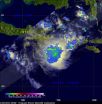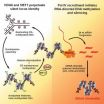(Press-News.org) Lincoln, Neb., March 20, 2014 – The nation's left-leaning citizens might be pleased by the findings of a new University of Nebraska study that finds those who live in liberal states tend to be healthier.
But conservatives could also take satisfaction in the same study's conclusion that strong communities also foster better health.
"Some people might like the argument that liberal government automatically leads to healthier people, because it supports their worldview," said Mitchel Herian, a faculty fellow with the university's Public Policy Center and lead researcher on the new study. "But in the absence of a liberal government, you also see better levels of health if you have a strong community."
The study, published in the March issue of the journal Social Science and Medicine, combined data from the 2010 Behavioral Risk Factor Surveillance System to measure health, a 2009 Gallup Healthways Survey to measure levels of social trust and a 2010 index that rates liberalism in state government. In all, the study involved data collected from more than 450,000 people from across the country.
It found that states with high levels of liberalism and those with high levels of social trust have higher levels of health and well-being.
The two factors – liberalism and social trust – are not interchangeable. People who live in a California city might have liberal political beliefs but mistrust their neighbors, Herian said, while those who live in a small Texas town might mistrust government but count on their neighbors.
To measure a state's social capital, Herian and his colleagues used data from a survey that asked "If you lost a wallet or purse that contained $200 and it was found by a neighbor, do you think it would be returned with the money in it or not?"
To assess states' political profiles, the study used an index that scores each of the 50 states on their relative liberalism vs. conservatism. The index is based upon factors such as interest group ratings of congressional members, voting records and election results in congressional races. It is designed not only to assess partisanship, but the extent to which politicians favor liberal social policy.
Health and well-being were measured with questions from the behavior risk survey that asked respondents to rate their health and to report how frequently poor physical or mental health prevents them from carrying out daily activities. The researchers also took smoking habits and body mass index into consideration.
Herian authored the study with psychologists Louis Tay of Purdue University, Ed Diener of the University of Illinois and UNL graduate student Joseph A. Hamm.
"Liberals argue for government programs and conservatives argue for individual responsibility," Diener said. "When government programs are in place, people tend to be healthier. But when government programs are weaker, a person with lots of close ties and social capital can still be healthy. Their wife can get them to exercise, their friends can help them not drink too much, and their support for each other may directly affect their health. Loneliness is bad for health."
The researchers said the study has implications for health policy at the state and local levels. Herian, who has studied how social trust influences public policy, said he expects to do more research on how to measure social trust.
Tay said the study shows two pathways to improving people's health: Strong communities can provide good health outcomes, but government social programs also have a strong connection to good health and could be necessary to serve more fragmented and isolated communities.
Diener said the research demonstrates that good health is not just a matter of individuals "doing the right thing" like quitting smoking, exercising more and losing excess weight.
"Social factors have an influence, too," he said. "It might be government programs, or it might be 'social capital' – having supportive others around us – that can influence our health beyond just each of us doing the right things."
INFORMATION:
Big government -- or good neighbors -- can improve people's health
Study explores connection between ideology, social capital and health
2014-03-20
ELSE PRESS RELEASES FROM THIS DATE:
Plankton make scents for seabirds and a cooler planet
2014-03-20
The top predators of the Southern Ocean, far-ranging seabirds, are tied both to the health of the ocean ecosystem and to global climate regulation through a mutual relationship with phytoplankton, according to newly published work from the University of California, Davis.
When phytoplankton are eaten by grazing crustaceans called krill, they release a chemical signal that calls in krill-eating birds. At the same time, this chemical signal — dimethyl sulfide, or DMS — forms sulfur compounds in the atmosphere that promote cloud formation and help cool the planet. Seabirds ...
Wind farms can provide society a surplus of reliable clean energy, Stanford study finds
2014-03-20
The worldwide demand for solar and wind power continues to skyrocket. Since 2009, global solar photovoltaic installations have increased about 40 percent a year on average, and the installed capacity of wind turbines has doubled.
The dramatic growth of the wind and solar industries has led utilities to begin testing large-scale technologies capable of storing surplus clean electricity and delivering it on demand when sunlight and wind are in short supply.
Now a team of Stanford researchers has looked at the "energetic cost" of manufacturing batteries and other storage ...
Satellite confirms Tropical Cyclone Mike's quick disappearing act
2014-03-20
Tropical Cyclone Mike didn't even last a day in the Southern Pacific Ocean as NOAA's GOES-West satellite revealed the storm dissipating just 24 hours after it was born.
The Joint Typhoon Warning Center's second update on Tropical Cyclone Mike was its last. At 2100 UTC/5 p.m. EDT Mike was located near 24.3 south latitude and 157.9 west, about 618 nautical miles/711.1 miles/ 1,145 km southwest of Papeete, Tahiti. Maximum sustained winds were near 35 knots/40 mph/62 kph at that time.
All warnings for the Southern Cook Islands were cancelled and Mike was quickly weakening ...
Face it: Instagram pictures with faces are more popular
2014-03-20
Like them or not, there's more proof that selfies aren't going away any time soon. Georgia Institute of Technology and Yahoo Labs researchers looked at 1.1 million photos on Instagram and found that pictures with human faces are 38 percent more likely to receive likes than photos with no faces. They're also 32 percent more likely to attract comments. The study is one of the first to examine how photos with faces drive engagement on large-scale, image-sharing communities.
The researchers also found that the number of faces in the photo, their age or gender didn't make ...
NASA sees ex-Tropical Cyclone Gillian's remnants persist
2014-03-20
NASA's TRMM satellite continues to follow the remnants of former Tropical Cyclone Gillian as it moved from the Southern Pacific Ocean into the Southern Indian Ocean where it appears to be re-organizing.
The persistent remnants of tropical cyclone Gillian have moved westward over 2,700 km/1,674 miles since forming in the Gulf of Carpentaria on March 8, 2014.
Gillian's coherent remnants were located just to the southeast of the Indonesian island of Java when the Tropical Rainfall Measuring Mission or TRMM satellite flew overhead on March 20, 2014 at 0415 UTC/12:15 a.m. ...
Interpreting neuroimages: The technology and its limits
2014-03-20
Neuroimages play a growing role in biomedical research, medicine, and courtrooms, as well as in shaping our understanding of what it means to be human. But how helpful are they at answering complex questions such as: What is depression? Is a defendant lying? Do we have free will?
These are among the topics explored in Interpreting Neuroimages: An Introduction to the Technology and Its Limits, a special report of the Hastings Center Report. It is edited by Josephine Johnston, a research scholar and director of research, and Erik Parens, a senior research scholar, and ...
Proteins that control energy use necessary to form stem cells
2014-03-20
Proteins that regulate energy metabolism are essential for stem cell formation, University of Washington researchers find.
Two proteins that control how cells metabolize glucose play a key role in the formation of human stem cells, UW researchers report.
The findings advance scientists' understanding of stem cell development but also suggest that the proteins, which also play a role in the process that transforms normal cells into cancer stem cells, might also be targets for new cancer therapies, the researchers write.
The findings appear online in the journal Cell ...
Gene silencing instructions acquired through 'molecular memory' tags on chromatin
2014-03-20
BLOOMINGTON, Ind. -- Scientists at Indiana University have unlocked one of the mysteries of modern genetics: how acquired traits can be passed between generations in a process called epigenetic inheritance. The new work finds that cells don't know to silence some genes based on information hardwired into their DNA sequences, but recognize heritable chemical marks that are added to the genes. These chemical tags serve as a form of molecular memory, allowing cells to recognize the genes and remember to silence them again in each new generation.
The discovery made by a 12-member ...
Study reveals a major mechanism driving kidney cancer progression
2014-03-20
The shortage of oxygen, or hypoxia, created when rapidly multiplying kidney cancer cells outgrow their local blood supply can accelerate tumor growth by causing a nuclear protein called SPOP—which normally suppresses tumor growth—to move out of the nucleus to the cytoplasm, where it has the opposite effect, promoting rapid proliferation.
In the March 20, 2014, issue of the journal Cancer Cell, researchers from Chicago and Beijing describe the mechanisms that enable hypoxia to cause the overexpression of SPOP. They show that hypoxia also stimulates the shuttling of SPOP ...
Passive acoustic monitoring reveals clues to minke whale calling behavior and movements
2014-03-20
Scientists using passive acoustic monitoring to track minke whales in the Northwest Atlantic have found clues in the individual calling behaviors and movements of this species. These findings, recently published online in the journal Behaviour, provide insight into one of the least studied baleen whales.
"Although we regularly observe minke whales in our Gulf of Maine surveys, we know very little about minke whale vocalizations and how they use sound in their behavioral and social interactions," said Denise Risch, lead author of the study and a marine mammal researcher ...
LAST 30 PRESS RELEASES:
Roadmap for Europe’s biodiversity monitoring system
Novel camel antimicrobial peptides show promise against drug-resistant bacteria
Scientists discover why we know when to stop scratching an itch
A hidden reason inner ear cells die – and what it means for preventing hearing loss
Researchers discover how tuberculosis bacteria use a “stealth” mechanism to evade the immune system
New microscopy technique lets scientists see cells in unprecedented detail and color
Sometimes less is more: Scientists rethink how to pack medicine into tiny delivery capsules
Scientists build low-cost microscope to study living cells in zero gravity
The Biophysical Journal names Denis V. Titov the 2025 Paper of the Year-Early Career Investigator awardee
Scientists show how your body senses cold—and why menthol feels cool
Scientists deliver new molecule for getting DNA into cells
Study reveals insights about brain regions linked to OCD, informing potential treatments
Does ocean saltiness influence El Niño?
2026 Young Investigators: ONR celebrates new talent tackling warfighter challenges
Genetics help explain who gets the ‘telltale tingle’ from music, art and literature
Many Americans misunderstand medical aid in dying laws
Researchers publish landmark infectious disease study in ‘Science’
New NSF award supports innovative role-playing game approach to strengthening research security in academia
Kumar named to ACMA Emerging Leaders Program for 2026
AI language models could transform aquatic environmental risk assessment
New isotope tools reveal hidden pathways reshaping the global nitrogen cycle
Study reveals how antibiotic structure controls removal from water using biochar
Why chronic pain lasts longer in women: Immune cells offer clues
Toxic exposure creates epigenetic disease risk over 20 generations
More time spent on social media linked to steroid use intentions among boys and men
New study suggests a “kick it while it’s down” approach to cancer treatment could improve cure rates
Milken Institute, Ann Theodore Foundation launch new grant to support clinical trial for potential sarcoidosis treatment
New strategies boost effectiveness of CAR-NK therapy against cancer
Study: Adolescent cannabis use linked to doubling risk of psychotic and bipolar disorders
Invisible harms: drug-related deaths spike after hurricanes and tropical storms
[Press-News.org] Big government -- or good neighbors -- can improve people's healthStudy explores connection between ideology, social capital and health








